

ENVIRONMENTAL, SOCIAL AND GOVERNANCE REPORT
2023-2024
LEADING BY EXAMPLE: OUR JOURNEY TOWARDS SUSTAINABILITY AND INCLUSION



2023-2024
LEADING BY EXAMPLE: OUR JOURNEY TOWARDS SUSTAINABILITY AND INCLUSION
As part of Canada’s foreign affairs and development efforts, the International Development Research Centre (IDRC) champions and funds research and innovation within and alongside developing regions to drive global change. We invest in high-quality research in developing countries, share knowledge with researchers and policymakers for greater uptake and use and mobilize our global alliances to build a more sustainable and inclusive world.
Our head office is in Ottawa, Canada, while five regional offices keep us close to the researchers and projects we fund. The regional offices are in Montevideo, Uruguay; Nairobi, Kenya; Dakar, Senegal; Amman, Jordan; and New Delhi, India.
IDRC identifies and responds to critical global development challenges with research that turns knowledge into impact. Our long-time commitment to this mission was renewed with Strategy 2030, which sets an ambitious agenda for creating a more sustainable and inclusive world.
IDRC’s Environmental Social Governance (ESG) framework aligns with Strategy 2030 while bringing a new perspective to the impact of our activities on the world. The framework is a comprehensive approach that looks at everything we do while prioritizing action in areas where we can continue to learn, implement and integrate ESG thinking into the Centre’s research programs, partnerships, internal operations and practices.
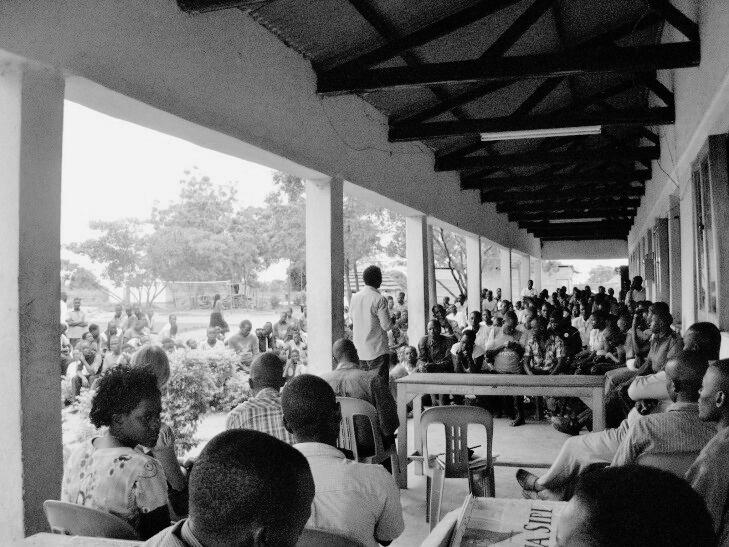
Reduction in Scope 2 GHG emissions*
*Scope 1 and Scope 2 emissions data according to baseline financial year 2020-2021
Initiatives introduced as part of IDRC’s first Accessibility Plan 46
Leaders’ participation rate in IDRC’s Inclusive Leader Playbook workshop, a DEI initiative 76
5 years of consistent growth of representation of women, minorities and persons with disabilities among IDRC employees
1
New Supplier Code of Conduct sets the standard for sustainability, transparency, and social responsibility in every link in our supply chain
*Scope 2 emissions data according to baseline financial year 2020-2021
As the new President of IDRC, I am proud to share the progress made in the last year since my arrival to advance our commitment to Environmental, Social and Governance (ESG) considerations. IDRC’s work in these areas is essential to our mandate. Fully integrating ESG considerations into every aspect of our work better positions IDRC to address the tremendous need for innovative, sustainable and equitable solutions shaped by the people and communities experiencing challenges first-hand.
I strongly support IDRC’s belief that our programming, organization and operations must reflect the values that infuse the research we support, namely environmental action, social justice and good governance, as well as diversity, equity and inclusion (DEI).
We place human rights and dignity at the centre of all we do. We value our amazing global team and partners. Creating a secure and positive work environment for them is essential. For example, our new policy on preventing sexual exploitation, abuse and harassment will serve as the cornerstone for our zerotolerance approach. This policy builds on our overall ethical framework, which includes policies on workplace violence and harassment. Together, these policies reinforce our dedication to being an ethical, respectful and inclusive organization, reflecting our commitment to do no harm in the delivery of our mandate.

The launch of IDRC’s ESG framework strengthens accountability and transparency and demonstrates our resolve to implement ESG standards into every aspect of our programming and operations.
The 2023-2024 ESG report tells the story of the second full year of IDRC’s ESG journey. We have reduced our Scope 2 greenhouse gas emissions by 35%, making progress towards our organizational goal of net zero carbon emissions by 2050. We advanced DEI initiatives through an action plan featuring three pillars (inclusive organizational climate and culture, leadership commitment and accountability, and awareness and education). In addition, we are making progress on IDRC's first Accessibility Plan covering 2023-2025, having already implemented a number of its initiatives, while actively working on others, and with some still to be initiated.
Our ESG journey is a collective effort made possible by Team IDRC — employees, management, the Board of Governors and all external partners and stakeholders. Together, we will bring to life our vision of a more sustainable and inclusive world by walking the talk as an institution. Thank you for your dedication. The ESG progress we have achieved so far makes me excited about what we will achieve, together, in the years ahead.
President Julie Delahanty
In this report, we continue to chart our progress in embedding Environmental, Social and Governance (ESG) principles at the core of our operations. Building on the foundation laid in our inaugural report, we delve deeper into our ESG journey, demonstrating how our actions align with Strategy 2030 and how we're advancing toward our goals. This report also reflects our commitment to transparency and accountability, illustrated by the tracking and monitoring of outcomes and goals.
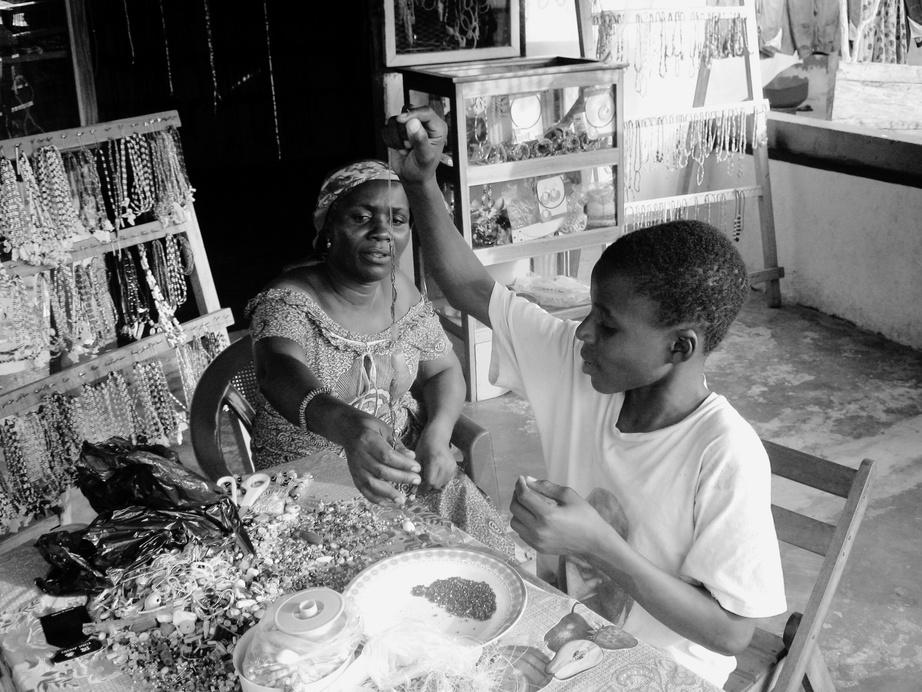
This document offers insights into our strategic priorities and the milestones that have strengthened our ESG framework. Beyond a mere progress update, this report embodies our ongoing dedication to sustainable and inclusive global development and our efforts to adapt and evolve our ESG practices in a dynamic world.
Building on the momentum from the 2022-2023 ESG report, we continue to use international reporting frameworks to enhance our disclosures, enrich our ESG framework and elevate our future reporting ambitions.
In alignment with the Federal Government's directives, as outlined in the Budgets of 2019 and 2021, we have included a dedicated section on the Task Force on Climate-Related Financial Disclosures (TCFD) in the Management Discussion and Analysis section of our 2023-2024 Annual Report. This complies with federal mandates and underscores our commitment to climate-related financial transparency and accountability.
Our support for the UN's Sustainable Development Goals (SDGs) remains a cornerstone of our research and programming efforts to drive global change. The SDGs continue to help us refine our ESG framework and reporting, ensuring our contributions are impactful and aligned with global sustainability and inclusivity objectives. Through this journey, we aim to not just adhere to these global benchmarks but to embody the principles they represent, furthering our mission to foster a more sustainable and equitable world.
The Government of Canada encouraged Crown corporations to adopt the recommendations of the Task Force on Climate-related Financial Disclosure (TCFD).
The Government of Canada’s budget requires Crown corporations with > $1 billion in assets to adopt the recommendations of the TCFD by 2024. The development of an ESG framework was identified as a priority. Current state analysis performed to initiate IDRC’s ESG journey.
Completed a benchmarking assessment to gain an understanding of the ESG practices and reporting initiatives of our peers.
Evaluated IDRC initiatives and practices that fall within each ESG element.
Established a GHG emissions composite baseline.
Finalized the ESG framework to create an ongoing and sustainable roadmap. The Board of Governors endorsed the ESG framework and priorities.
Developed GHG emissions reduction target.
Began to tell our ESG story with our first report.
Entered into an agreement with Air Canada for the Leave Less program.
Continued to set goals and work towards achieving them.
Reduced GHG emissions from travel through Air Canada’s Leave Less program.
Included TCFD disclosures in the annual report.
Introduced a DEI Values Playbook for employees and an Inclusive Leader Playbook.
Developed safeguarding against sexual exploitation, abuse and harassment policy.
Enhance the risk management function to improve climate-related risk control.
Launch a travel planner to optimize corporate travel.
Implement a new incident reporting tool, ClearView Connects™.
Launch updated employee Code of Conduct.
At IDRC, Environmental, Social and Governance (ESG) principles are not a trend; they are the foundation of our mission and operations. For more than 50 years, it has been our mandate to support science and innovation in developing countries and to help researchers in these regions find solutions to the most pressing problems facing their communities and countries. Whether tackling climate change, improving access to healthcare, developing sustainable agriculture, influencing policy change or strengthening governance, we have always been committed to creating a more sustainable and inclusive world.
Our longstanding commitment to fostering sustainable and inclusive global development through science and innovation has never been more critical. Our approach to ESG is holistic, encompassing not just our programming but also our day-to-day operations.
Our research and programming inherently address key ESG dimensions—whether it's combating climate change, advancing global health, promoting sustainable economies, fostering democratic governance or enhancing education and science. These priority areas not only align with but actively propel our ESG objectives forward:
Climate resilient food systems: We're empowering vulnerable communities to adapt to climate impacts, ensuring access to sustainable and inclusive food systems.
Sustainable and inclusive economies: Our work supports equitable economic growth, creating opportunities for all, particularly women and youth.
Democratic and inclusive governance: By promoting transparent and accountable governance, we're enabling individuals to influence the policies affecting their lives.
Global health: We're strengthening health systems to better respond to epidemics, and we are improving access to health services for marginalized populations.
Education and science: Our initiatives aim to provide equitable education opportunities and foster environments where every child, especially girls, can thrive.
UN’s SDGs at the heart of what we do
Climate Resilient Food Systems
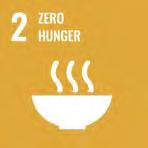
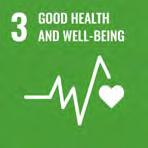
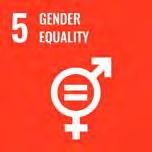
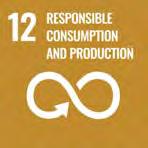
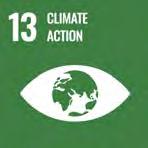
Sustainable and Inclusive Economies
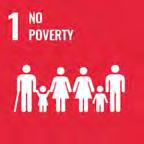

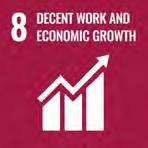
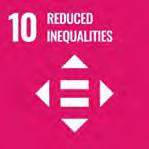

Democratic and Inclusive Governance


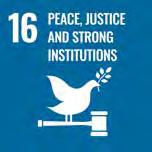
Global Health


Education and Science
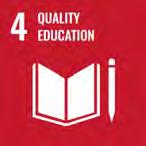

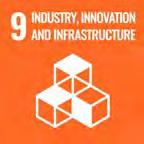
Our Strategy 2030 harnesses our experience to tackle significant global challenges such as climate change and gender inequality, directly contributing to the UN’s Sustainable Development Goals (SDGs). Recognizing our longstanding development research contributions isn't enough. True ESG integration means applying these principles across our organization—enhancing our credibility, reinforcing stakeholder confidence and embodying the high standards of business ethics that underpin our relationships.
As we move forward, our ESG framework will evolve to encapsulate our impactful research, programming and organizational practices. This ongoing journey involves constant learning, improvement and the willingness to embrace new challenges and opportunities.
In the subsequent sections, we highlight our current initiatives, future plans and the steps we're taking to ensure ESG principles are embedded in our work. With a comprehensive ESG lens, we're scrutinizing every aspect of our operations, committing to action that builds a more sustainable and inclusive world.
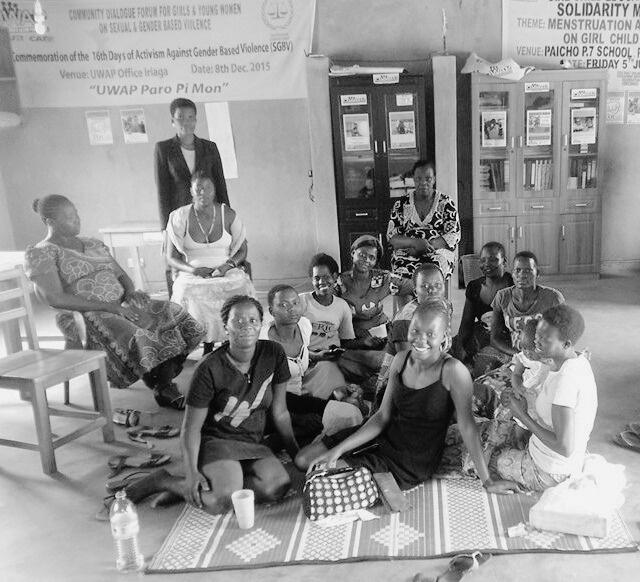
For information on how we support the development outcomes listed above, please refer to Strategy 2030.
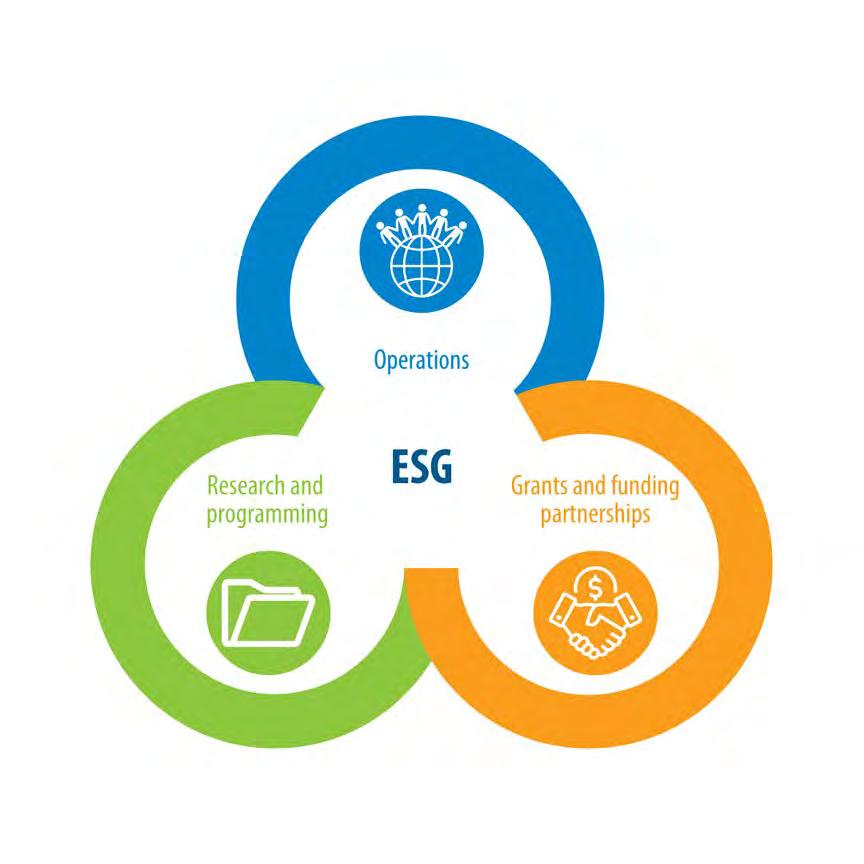
Operations: all operations managed by IDRC (e.g., employees, policies and procedures, financials and facilities).
Research and programming: research priority areas (e.g., global health, education and science, etc.)
Funding and partnerships: processes and considerations related to the selection and relationship management of partners and grantees.
Understanding what ESG aspects are most critical to our organization and stakeholders guides our efforts. By identifying and ranking ESG topics based on their importance, we focus on initiatives that provide the most significant impact and value for both IDRC and its diverse stakeholders. The process to identify and rank IDRC’s ESG topics unfolded in three key steps:
Our engagement process began with a comprehensive peer benchmarking assessment, which helped us identify 18 crucial ESG topics for reporting. We continued our stakeholder engagement through dialogues with IDRC’s Board of Governors, the Centre Management Committee and other key internal contributors. Insights from these discussions, along with a review of peer practices and the Government of Canada’s ESG commitments, informed our analysis and shaped our initial list of significant ESG topics. These topics were then refined and grouped into broader categories, such as energy consumption, to streamline and clarify our focus areas. This consolidation enabled us to effectively assign these topics to the organizational functions they most influence: operations, research and programming and grants and funding partnerships.

We adopted a dual-perspective materiality framework to prioritize ESG topics, assessing each topic's impact on IDRC's mission and its broader societal and environmental effects. The “Impact on IDRC’s mission” gauged how each topic could propel our mission forward, while the “Impact on society and the environment” looked at their external effects. This dual assessment helped us position each topic on a materiality matrix, balancing their organizational and external significance. The IDRC team conducted the prioritization based on the two axes internally.
The topics were reviewed and refined by consulting and collaborating with internal stakeholders across IDRC. This validation process ensured that we identified the most significant and relevant topics to serve as a starting point for our ESG efforts.
The list of ESG topics has been provisionally placed on the matrix below using a prioritization approach, where each topic was assessed and categorized based on its impact both on IDRC’s mission and on society and the environment.
Responsible and inclusive governance practices Legend: Environment Social Governance
Employee engagement and satisfaction
Culture and values
Human rights
Health and wellbeing
Data privacy and access to information
Responsible procurement
Business and research ethics
This ESG report highlights select topics that demonstrate our ongoing efforts, providing a glimpse into our ESG journey without being exhaustive. It emphasizes the importance of prioritizing material sustainability issues and setting achievable goals rather than spreading our efforts too thin across numerous targets.
These topics are critical in terms of societal impact and alignment with the organization's mission, and represent priority areas for immediate action and resource allocation. Our high-priority topics are:
Human rights (13)
Health and wellbeing (14)
Travel (01)
Just transition (06)
Topics in the medium impact zones may offer strategic growth opportunities or risk mitigation areas for IDRC. They should be integrated into long-term strategic planning and policy development.
Climate change and resilience (05) appears in the quadrant with high environmental impact and medium mission impact. This suggests a significant environmental concern that moderately aligns with IDRC's mission. Importantly, Climate change and resilience (05) also represents a key area for research funded by the Centre, highlighting its integral role in IDRC’s strategic objectives.
Human rights (13) and Health and well-being (14) are undisputed core priorities. All other social topics listed in the matrix are in the high mission impact and medium societal and environmental impact quadrant. These topics are pertinent to internal organizational practices and their broader influence on societal structures.
Several governance issues, such as Business and research ethics (17) and Responsible and inclusive governance practices (18), are placed in the high impact area for IDRC and medium impact area for society and environment, indicating their importance to IDRC's operational integrity and ethical standards. Responsible procurement (16) is in the medium quadrant and is also prioritized.
Ongoing monitoring and compliance – low priority
As a small Crown corporation, IDRC is not involved in manufacturing or any significant resource consumption activities. Thus, lower-impact areas like energy consumption (02), water consumption (03) and waste management (04) might not require immediate action but should be monitored to ensure compliance and to track any shifts in stakeholder expectations or the regulatory landscape.
Another area topic not currently prioritized is data privacy and access to information (15), since IDRC is fulfilling its commitments and remains compliant with all current requirements and regulations:
Data privacy: All personal information held or collected by IDRC is protected under Canada’s Privacy Act.
Access to information: IDRC believes open research data can accelerate collaboration and scientific discovery. We support the fundamental scientific requirement of allowing others to confirm or challenge research results. That’s why we work to remove barriers to research results (see IDRC’s Open Access Policy) and the underlying data that informs it.
IDRC will revisit its materiality process in the upcoming reporting cycles to ensure it reflects the evolving context of ESG, incorporates diverse stakeholder perspectives. This ongoing effort will involve staying updated on emerging trends, standards, and frameworks, allowing us to continuously refine and enhance the relevance and comprehensiveness of our ESG reporting.
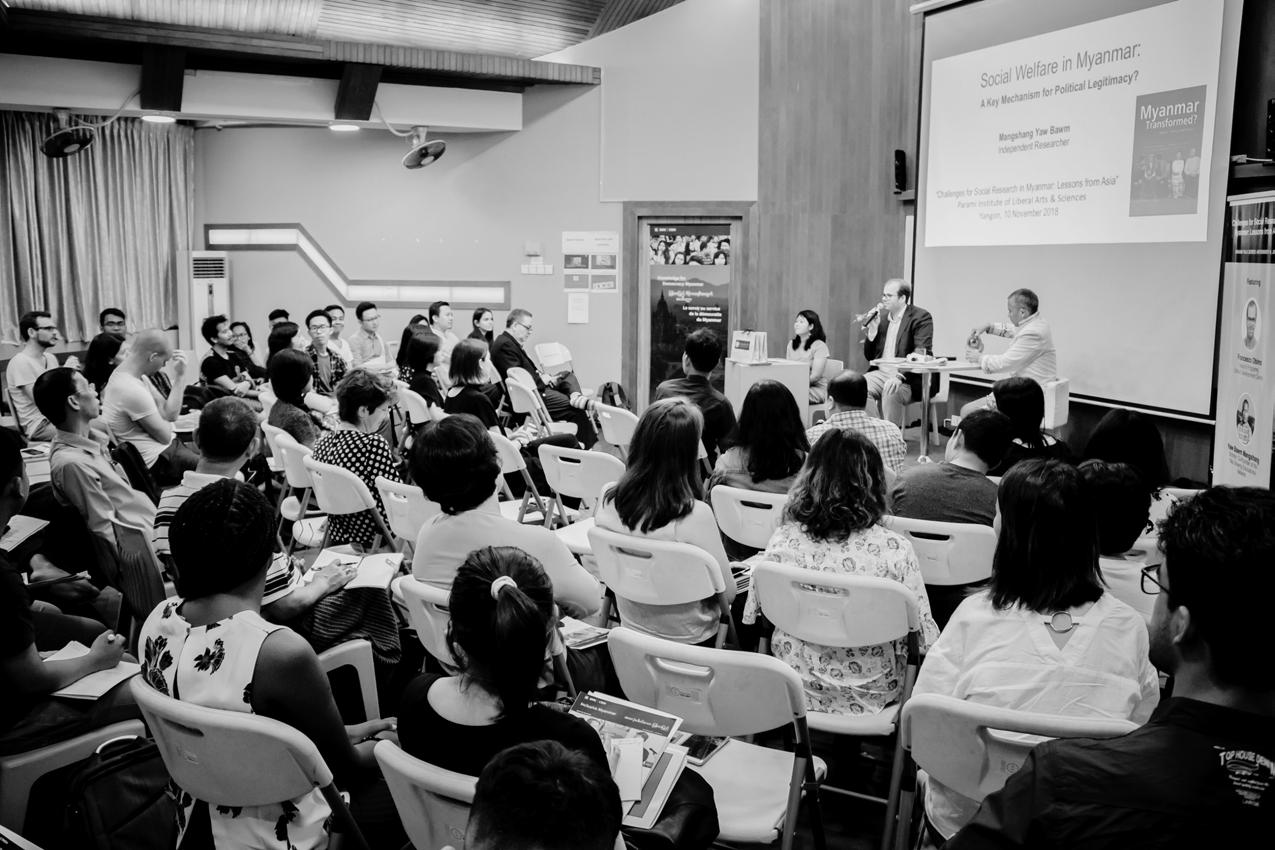
Relevance to the ESG framework
Material topic
Human rights
Health and wellbeing
Operations Research and programming Grants and fundingpartnerships
3- Good health and well-being
4- Quality education
5-Gender equality
8-Decent work and economic growth
10- Reduced inequalities
16- Peace, justice and strong institutions
3- Good health and well-being
Climate change and resilience 4- Quality education 13- Climate action
8- Decent work and economic growth
Business and research ethics
Responsible and inclusive governance practices
Diversity, equity and inclusion
Safeguarding
12- Responsible consumption and production
16- Peace, justice and strong institutions
8- Decent work and economic growth
16- Peace, justice and strong institutions
4- Quality education
5- Gender equality
8- Decent work and economic growth
10- Reduced inequalities
5- Gender equality
8- Decent work and economic growth
10- Reduced inequalities 16- Peace, justice and strong institutions
Relevance to the ESG framework
Material topic
Training and education
Operations Research and programming Grants and fundingpartnerships
Culture and values
Employee engagement and satisfaction
Capacity building
Responsible procurement
Energy consumption
Water consumption
Waste management
Data privacy and access to information
Contribution to SDGs
4- Quality education
13- Climate action
8- Decent work and economic growth
12- Responsible consumption and production
16- Peace, justice and strong institution
8- Decent work and economic growth
4- Quality education
8- Decent work and economic growth
12- Responsible consumption and production
16- Peace, justice and strong institutions
7- Affordable and clean energy
9- Industry, innovation and infrastructure
13- Climate action
9- Industry, innovation and infrastructure
9- Industry, innovation and infrastructure
16- Peace, justice and strong institutions

Recognizing the diversity of our staff and the communities we serve, the regional office renovations prioritize accessibility standards. These updates are not just physical changes; they are designed with an inclusive mindset, providing spaces that are welcoming and accommodating to people with disabilities. This includes the implementation of universal design principles, such as barrier-free access and adaptive work environments that promote both comfort and productivity.
In 2023, we continued to modernize the spaces and places where our employees work. With our new Ottawa location as our inspiration, the changes to these locations increased sustainability, accessibility and employee well-being. This ongoing journey reflects our dedication to ESG principles throughout our global operations.
Each office renovation meets high environmental standards with a focus on air quality and energy efficiency. For instance, our new office in Delhi now features a stateof-the-art air filtration system, ensuring a healthier working environment.
Ensuring all employees, including those in regional offices, felt included has been a key challenge. To meet this challenge, we made significant investments in modern tools and technology to enhance inclusion for successful collaboration and innovation. Adopting common technology setup facilitates a seamless hybrid meeting experience that supports both in-person and remote collaboration. This consistency ensures that all employees, regardless of their location, have equal access to digital tools and resources, promoting equity across the organization.
The material topics covered in this section include “Climate change and resilience” (5), “Diversity, equity and inclusion” (7) and “Health and well-being” (14).
Regional highlights
MONTEVIDEO
The renovations at this location included the addition of advanced air filtration and upgraded digital infrastructure.
The changes at this location included significant upgrades to enhance accessibility and usability.
Renovations are underway (spring 2024) with a focus on diversity and accessibility. A prayer room and more private meeting spaces will be added, supporting the specific needs of our diverse workforce.
Plans for these locations are set to unfold in the 2024-2025 financial year. Furniture and technology refresh at the Nairobi location are planned for spring 2024. The Amman office will relocate, a decision based on several factors, including operational needs and staff feedback.
Across all regions, the office designs feature a similar aesthetic that respects local cultures while maintaining a unified look and feel. This approach not only strengthens our brand identity but also fosters a sense of belonging and community among staff. In our ongoing commitment to enhancing the work environment, we've integrated new furniture solutions with better ergonomics, ensuring that every workspace supports employee wellbeing. By equipping each office with the same high-quality furniture and technology, we ensure that every member of IDRC, no matter where they are, experiences a workspace that is both functional and inspiring.
The regional renovations demonstrate our commitment to applying an ESG mindset across all facets of our operations. By focusing on sustainable building practices, inclusivity and digital parity, we continue to foster a work environment that values and supports our global team, helping them to thrive in a dynamic and interconnected world.
In the following sections, we highlight the progress made across our Environmental, Social and Governance (ESG) initiatives during the 20232024 financial year. We describe the steps we have taken to advance our ESG framework, showcasing our dedication to sustainable and ethical operations while being transparent about the challenges we’ve faced. We also outline our plans to build on this progress in the years to come.
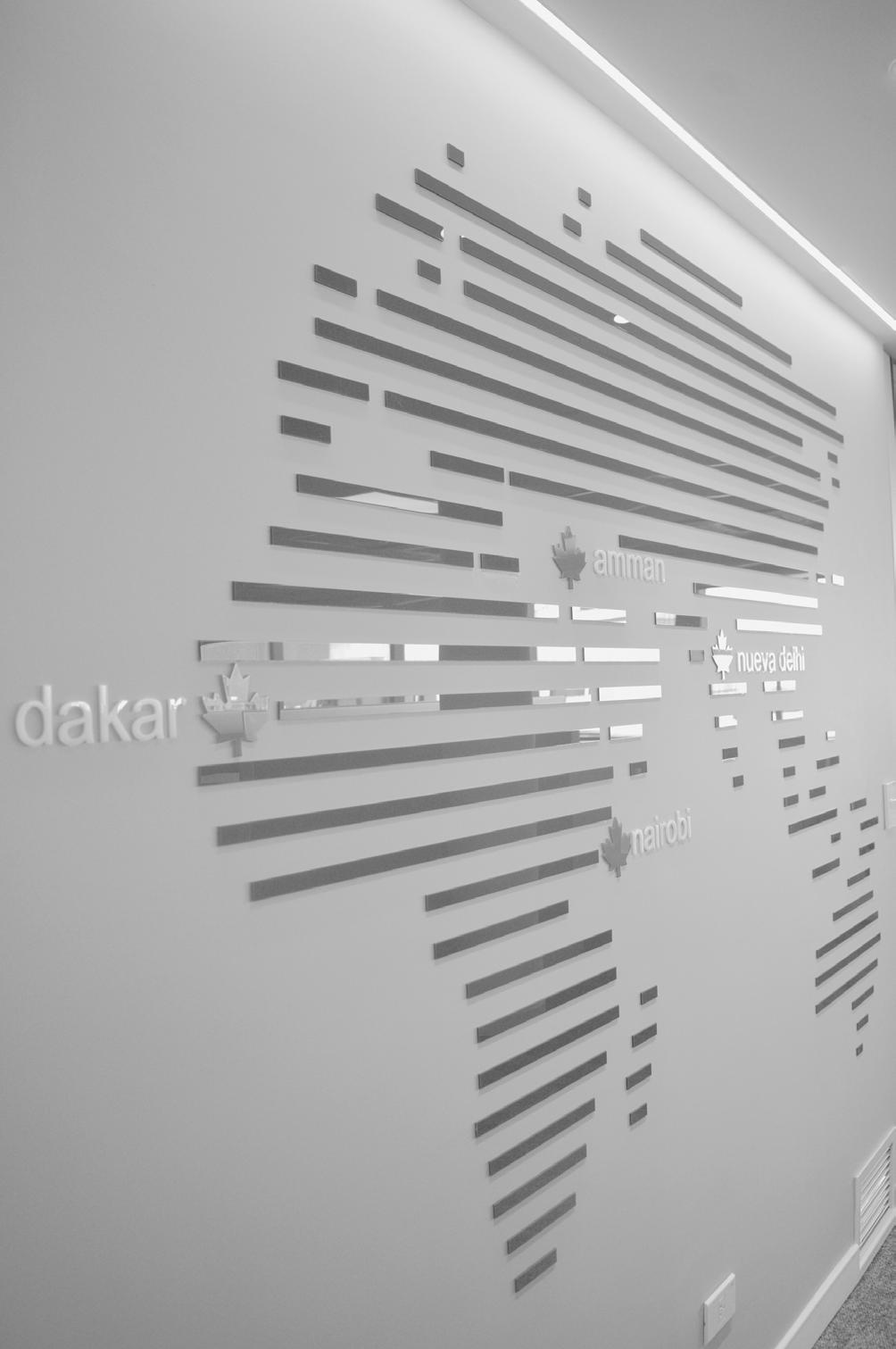

The environmental pillar of ESG illustrates our understanding of our impact on the environment. As a critical part of our ESG journey, this helps us identify opportunities to apply environmentally responsible practices across our organization.
The GHG Protocol was used as a reference to support the calculation of IDRC’s Scope 1, 2 and 3 emissions.
Scope 1 emissions are direct greenhouse gas (GHG) emissions that occur from sources that are controlled or owned by an organization (e.g., emissions associated with fuel combustion in boilers, furnaces or vehicles).
Scope 2 emissions are indirect GHG emissions associated with the purchase of electricity, steam, heating or cooling. Although scope 2 emissions physically occur at the facility where they are generated, they are accounted for in an organization’s GHG inventory because they are a result of the organization’s energy use.
Scope 3 emissions are the result of activities from assets not owned or controlled by the reporting organization, but that the organization indirectly affects in its value chain. The GHG Protocol defines 15 categories of scope 3 emissions, though not every category will be relevant to all organizations.
Focusing on more accuracy in our GHG emissions calculations, we revisited the numbers for the baseline year to address the financial year 2020-2021 instead of the calendar year, thereby ensuring consistency with the period of this report.
Source
Scope 1: direct emissions
To calculate our Scope 2 emissions for 2023-2024, we adopted the International Energy Agency (IEA) factors, as they reflect emissions factors more representative of IDRC’s operations. To ensure a like-for-like comparison, we have retrospectively applied the equivalent factors, recalculated and restated the 2020-2021 Scope 2 emissions.
3
We reduced Scope 2 emissions by 35% compared to the 2020-2021. This was primarily due to the move to a new office in Ottawa, which reduced our footprint by 40% in a more energy-efficient building. This helped us to achieve 55% of our 2024-2025 target for Scope 2 emissions.
Air travel emissions reductions
In 2023-2024, we worked to achieve greater accuracy and granularity for the GHG emissions resulting from our business travel. This necessitated understanding the type of air travel (e.g., cabin type classification of business air travel), which has allowed us to calculate our emissions more accurately. This revised methodology was used to calculate our Scope 3 - Category 6 business travel air GHG emissions.
Given the material contribution of GHG emissions to our business travel, we have revised our baseline year for Scope 3 emissions to 2023-2024. Our 2023-2024 GHG emissions include data from April 1, 2023, to March 31, 2024; however, we have removed data from prior years since it is no longer comparable.
We remain committed to reducing air travel emissions by reducing air travel, exploring partnerships with other airlines to purchase sustainable aviation fuel and exploring other opportunities for emission reductions.
IEA,EmissionsFactors2023,IEA,Parishttps://www.iea.org/data-and-statistics/data-product/emissions-factors-2023
Our partnership with Air Canada's Leave Less Travel Program underscores our commitment to sustainable travel, highlighting the innovative steps we are taking to reduce the amount of greenhouse gases emitted into the atmosphere while maintaining our global operational effectiveness.
Air travel is the largest component of our greenhouse gas emissions. Reducing these emissions without limiting the important work we do globally requires innovative thinking and approaches.
The Air Canada Leave Less Travel Program is a cornerstone of our strategy to address this challenge. Through this program, we purchase Sustainable Aviation Fuel (SAF) to reduce the carbon emissions associated with our flights.
In the financial year 2023-2024, IDRC's participation in the Leave Less Travel Program led to a notable reduction in our carbon footprint:
1,002,113 miles flown with Air Canada, producing an estimated 754.65 tCO2e of GHG emissions.
By purchasing SAF, we achieved an 8% reduction in our GHG emissions from Air Canada flights.
By purchasing SAF in 2023-2024 we achieved an 8% (or 58 tCO2e) reduction in our GHG emissions from Air Canada flights. This is equivalent to:
959 The emissions saved by planting tree seedlings grown for ten years.
34 Travelling the TransCanada Highway
12 The electricity required to power homes for an entire year. times from Victoria, BC to St. John's, NL.
This is just a start. We will continue to work together to create a more sustainable future.
IDRC's commitment to environmental stewardship continues to evolve, guided by our target to reduce greenhouse gas emissions and achieve net zero by 2050. To ensure we meet this objective we have laid out clear and achievable targets for reducing GHG direct and indirect emissions:
Scope 1 and 2: A reduction target of 40% by 2025, compared to our 2020-2021 baseline, with an additional 10% reduction every five years thereafter. This will be achieved through operational efficiencies such as upgraded HVAC systems, energy-efficient lighting and enhanced building insulation.
Electricity consumption has not been uniformly reduced across all sites; two global sites reported increases. Ottawa, our largest electricity consumer, has successfully cut its usage by 54%. Nonetheless, because Ottawa's electricity has a lower carbon intensity per kWh than our global sites, this reduction doesn't compensate for the increased carbon emissions from the other global offices.
Scope 3: Given that business travel comprises most of our Scope 3 emissions, our strategy includes both reducing the frequency of travel and making necessary travel more sustainable. The development of a sustainable travel policy and a travel decision matrix will guide our efforts, ensuring that travel is undertaken only when essential and done so responsibly.
In 2023-2024, IDRC focused on developing a decarbonization roadmap. The roadmap outlines the steps required to reduce emissions across all our activities, with a focus on innovative solutions like SAF and regional initiatives that support sustainable travel practices. By setting clear milestones and continually assessing our progress, we aim to achieve net zero by 2050.
Achievingnetzerowillrequirehuman-causedemissionstobereducedasclosetozeroaspossible,andany remainingemissionsshouldthenbebalancedwithanequivalentamountofcarbonremoval. Source:TheWhat, When,andHowofNet-ZeroEmissions|WorldResourcesInstitute(wri.org)
to NET ZERO by 2050
To achieve net zero carbon emissions by 2050, we are focused on actionable steps across all areas of our operations.

Reducing net air travel emissions by 20% New travel policy
Achieve 40% reduction in Scope 1 and 2
Additional 10% reduction in Scope 1 and 2
Commitment to net zero
Strategic initiatives:
Energy efficiency projects: LED lighting, advanced HVAC, building insulation
Renewable energy initiatives: solar, wind energy at offices
Sustainable travel policy: implement by end of 2024
Sustainable Aviation Fuel (SAF): partnerships, e.g., Air Canada's Leave Less Program

Baseline: Targets:
Scope 1 and 2 (FY 2020-2021)
Natural gas, fuel, and electricity - 180 CO2e
Scope 3 (FY 2023-2024)
Business travel (category 6) - 1961 CO2e
Scope 1 and 2 40% reduction by 2025, 10% reduction every 5 years
Scope 3
Sustainable travel practices and partnerships
The journey towards a sustainable future is both challenging and rewarding. Through strategic partnerships, innovative solutions and a committed approach to reducing our carbon footprint, IDRC is leading by example. Our ongoing efforts to balance operational needs with environmental responsibilities reflect our dedication to making a positive impact on the planet while fulfilling our mission to foster a more sustainable and inclusive world.
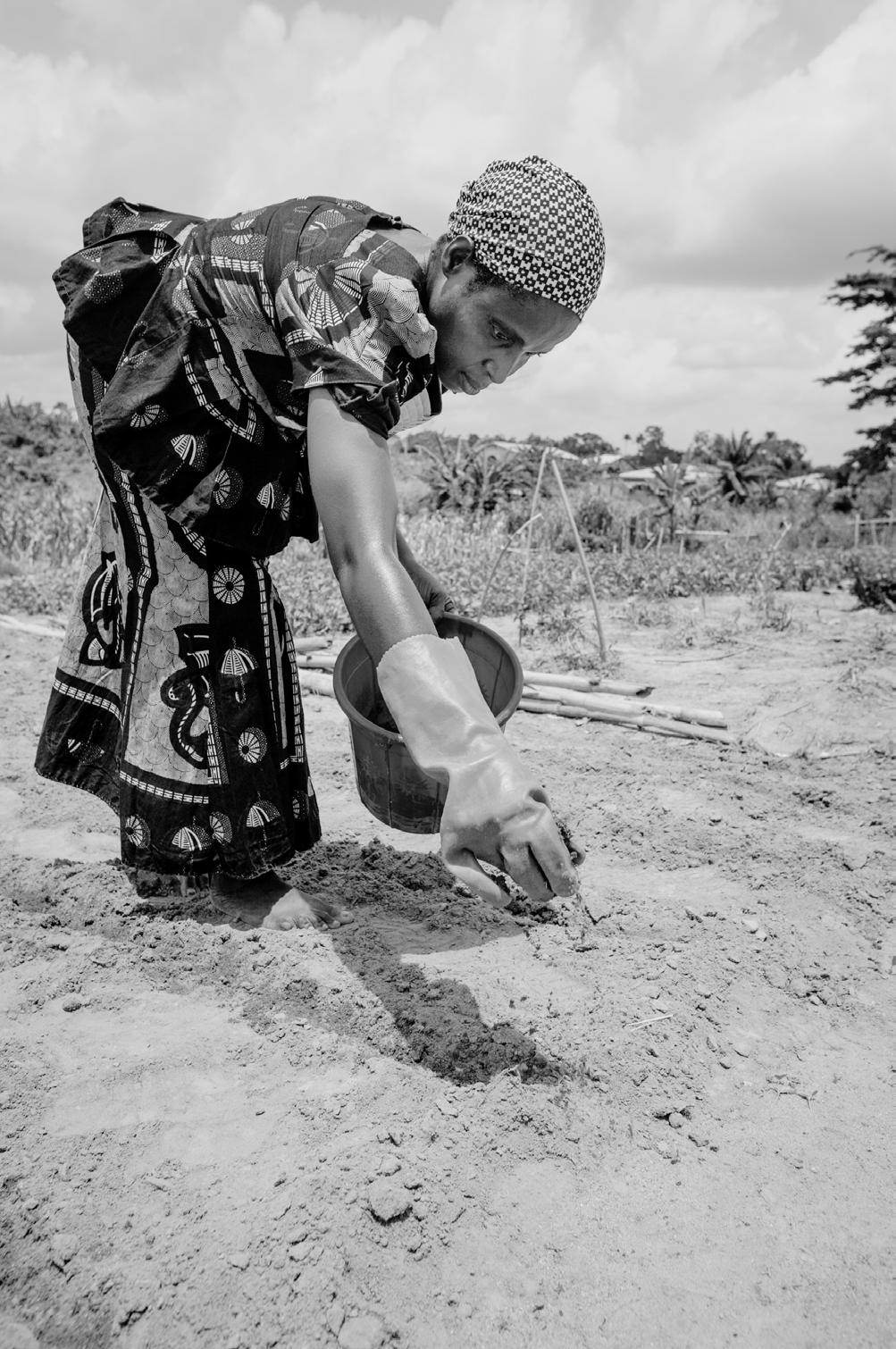
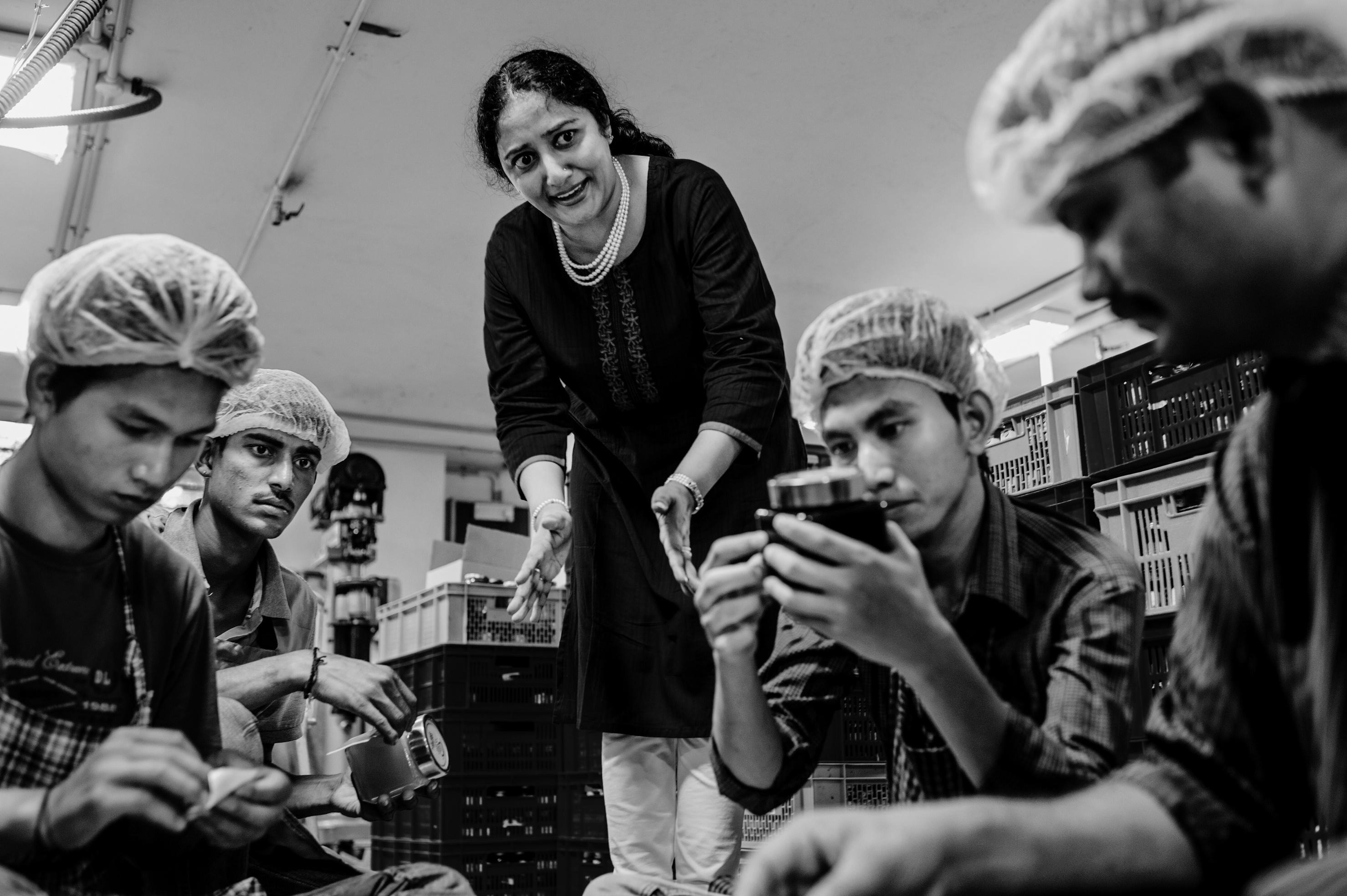
5
The social dimension of our ESG framework reflects our commitment to cultivating strong, ethical relationships with employees, suppliers, partners, grantees and the communities we serve. This section of the report showcases initiatives aimed at enhancing diversity, equity and inclusion across our organization. We also detail our strategies for fostering a culture that is closely aligned with our core values of respect and integrity, and the work we are doing to promote the health and well-being of our people.
"The DEI committee remains dedicated to guiding IDRC’s efforts in building an inclusive and equitable organization. The journey towards achieving equity, diversity and inclusion is challenging and demands ongoing commitment and effort from everyone, both individually and collectively. There is much to be done and we are excited to collaborate this year with Indigenous partners and advisors to develop an Indigenous Action Plan for IDRC. This will be a crucial step for IDRC to take towards decolonization, truth and reconciliation and Indigenous inclusion in its programmatic work globally."
~ Sandeep Prasad and Lancelot Ehode, DEI Committee Co-chairs
The materiality topics covered in this section include “Diversity, equity and inclusion” (7), “Culture and values” (12), and “Health and well-being” (14). 5
At the heart of our strategic focus in the 2023-2024 financial year are three critical areas: our culture, employment equity and creating an accessible workplace. Our efforts to integrate values and DEI deeply into the fabric of IDRC culture are pivotal, aiming to align every aspect of our work with these core principles. This includes rolling out a new Values Playbook that fosters an inclusive organizational climate.
The playbook is a guide to help employees live IDRC’s values of respect, intention and accountability in their daily work lives. It is a tool they can use repeatedly to improve their personal and professional growth. The playbook is designed to help our people think about their own values, learn from others and apply what they learn in their work. It is also a way to connect with colleagues and create a culture of collaboration, trust and inclusion.
Concurrently, we are committed to advancing employment equity, focusing on significant investments in employment and retention and DEI initiatives such as redesigning our performance management process and ensuring diverse hiring panels.
Furthermore, we are dedicated to making our workplace more accessible, ensuring compliance with current standards and proactively addressing any barriers that might hinder the full participation of all employees.
In 2023-2024, we worked with employees to develop a guide that helps us all live the IDRC values. This guide includes clear information for employees on expected actions and behaviours that will bring our values to life. We have also undertaken initiatives and activities to ensure leaders understand their role in modelling and supporting behaviours that align with our culture.
Our diversity, equity and inclusion (DEI) committee has been instrumental in delivering interactive workshops that deepened the understanding of IDRC values and DEI principles across the Centre. This year, we focused on three strategic pillars:
Inclusive organizational climate and culture 1. Leadership commitment and accountability 2. Awareness and education 3.
These pillars guided our comprehensive annual action plan, featuring targeted activities, clear timelines and measurable milestones to deeply embed DEI values into our operations.
To reinforce an inclusive organizational climate and culture and to ensure DEI values are deeply integrated across the Centre, the DEI committee conducted several interactive virtual workshops throughout 2023.
These workshops focused on why values matter, how they are defined at IDRC, how they are applied in daily work and how values can be observed and measured. Discussions also explored the behaviours that exemplify a comprehensive commitment to diversity, equity and inclusion. The insights captured from these sessions were distilled into the Values Playbook, which was launched in the fall of 2023.
Activating values workshops: these workshops built upon the Centre’s new Culture and Values statements and the initial training that focused on increasing DEI awareness and unconscious bias among all employees. 68% of all employees participated in these workshops.
Values Playbook manual introduction: these workshops facilitated the introduction of the Values Playbook to all IDRC employees. A participation rate of 78% of all employees is a testament to the commitment to IDRC’s core values.
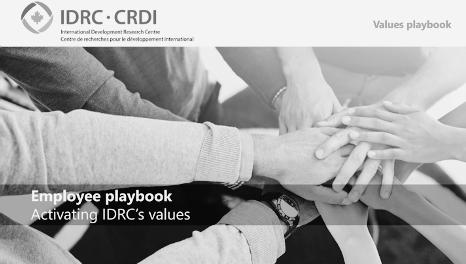
The Values Playbook is a practical guide for employees to embody IDRC’s core values of respect, intention, and accountability. It is a dynamic tool that supports ongoing personal and professional growth, encouraging reflection, peer learning and application of these insights. This process promotes both personal growth and a collaborative, trusting, and inclusive workplace culture.
In our ongoing commitment to fostering a diverse and inclusive workplace, we conducted two Inclusive Leadership workshops aimed at enhancing the leadership capabilities of our senior managers, middle managers and supervisors.
Inclusive Leadership workshops: these workshops focused on developing inclusive leadership skills across all levels of management. The participation rate for these workshops was 76% -- representing a significant portion of our leadership team.
Inclusive Leader Playbook Introduction: in November 2023, we introduced the Inclusive Leader Playbook workshops, designed to integrate IDRC’s corporate values with a strong emphasis on DEI.
The inclusive leader playbook workshops achieved an impressive participation rate of 86%, reflecting our leadership's strong commitment to our core values.
These workshops were vital to cultivating an inclusive culture. They ensure our leaders are wellequipped to champion diversity, equity and inclusion in their teams.
To streamline the awareness and education strategic pillar, the Gender Equality and Inclusion (GEI) programming framework leadership team launched the following initiatives and resources in 2023:
1. A glossary of terms
2. A learning hub on the Centre’s intranet site
3. A community of practice
4. A DEI newsletter
5. A series of community of practice events
In 2023-2024, we organized five community of practice events, each designed to engage and educate our employees on critical topics. These events covered:
Research legitimacy
GEI glossary
Global anti-feminist backlash
Decolonial feminist futures
GEI capacity assessment
Attendance at these sessions ranged from 18 to 55 participants, demonstrating a strong interest and commitment from our staff.
Additionally, we held a specialized training session on feminist knowledge translation for the GEI leadership team, attended by approximately 25 participants. All these events were accessible to all IDRC employees, ensuring inclusive participation and fostering a culture of continuous learning and development.
To further promote and lead awareness and education efforts across the organization, we are hiring a Gender Equality and Inclusion (GEI) advisor. This leadership position will integrate gendersensitive programming in line with global standards and organizational requirements. They will provide technical guidance on all aspects of program implementation and support crossdivisional strategies for gender equality and inclusion. The advisor will lead capacity building, continuous learning and the development of GEI competencies, ensuring the integration of these principles into corporate practices and documents.
As a Crown corporation, we are governed by the Employment Equity Act. This legislation requires that we report data on four underrepresented groups every year with the goal of achieving representation from these groups at labour market availability or above. This report provides the data and insights that form the basis for our DEI initiatives by helping us recognize where to focus and prioritize our efforts. It will continue to be an important part of disclosure.

Women: There is a strong, positive trend in the representation of women. Starting from 63.2% in 2019, there was a steady increase every year, reaching 66.8% in 2023. This consistent growth suggests sustained efforts towards increasing female representation.
Visible minorities: The representation of visible minorities is steadily increasing from 26.3% in 2019 to 31.5% in 2023.
Indigenous people: This category shows the least progress, as numbers have fluctuated over the 5-year period. Representation began at 0.8% in 2019, peaked at 1.3% in 2022, and then dropped back to 0.4% in 2023, the same level as in 2021. This category did not maintain a consistent upward trend and requires focused attention to improve representation.
Persons with disabilities: This category shows the most significant improvement, from 2.4% in 2019 to 9.9% in 2023. It is important to note that this increase primarily reflects an enhancement in measurement practices, particularly in selfidentification processes, rather than an actual change in workforce composition. This means more individuals are now identifying themselves as having disabilities, which contributes to the higher percentages seen in the recent data.
IDRC will continue its DEI efforts to increase representation in all underrepresented groups.

While our commitment to DEI remains steadfast, our focus has shifted over the past year toward refining and expanding upon our existing initiatives. Recognizing the importance of fostering a diverse and inclusive workplace, we have invested significant resources, time and energy into enhancing our processes and practices. Key highlights of our efforts include:
Ongoing engagement and awareness
Continuing our tradition of fostering understanding and connection with diverse communities, we regularly educate and promote events such as Orange Shirt Day, Black History Month and Pride celebrations aimed at increasing awareness and promoting inclusivity.
Unconscious bias training Introduction of diverse hiring panels
As part of our ongoing commitment to fostering a fair and equitable workplace, we have implemented mandatory unconscious bias training for hiring panels, leaders and all employees. This training is designed to mitigate unconscious biases that may influence decisionmaking processes, particularly recruitment.
As we continue our journey towards creating a more diverse and inclusive workplace, we remain committed to evaluating and refining our initiatives to ensure they effectively contribute to our overarching goals of equity and fairness for all employees.
A new addition to our initiatives is the introduction of diverse hiring panels for every recruitment process. Recognizing the importance of diverse perspectives in decision-making, we ensure that each panel comprises individuals from various backgrounds, fostering a culture of fairness and inclusivity in our hiring practices.

We have established three training sessions for all management and supervisory staff as refreshers before engaging in the performance management process:
Setting achievable objectives:
Empowering managers to define clear and attainable goals.
Giving and receiving feedback:
Enhancing skills in constructive communication.
Coaching for growth:
Fostering a culture of continuous improvement and professional development.
Understanding that the advancement of our DEI strategy is a journey, we have identified the following priorities for 2024-2025 and beyond:
Establishing a people and talent strategy, including talent acquisition and succession planning strategies to address gaps
Integrating key diversity and inclusion commitments in performance management plans of leaders
Incorporating DEI training in new employee onboarding tools
Encouraging participation in the annual employee self-identification campaign
Continuing to review and improve human resources policies, processes, and practices with a DEI lens
Supporting leaders in creating the space and opportunities for employees to participate and contribute fully to the workplace by building on conscious inclusion training
The following are part of the CEO’s objectives for 2024-2025:
Develop an Indigenous Action Plan, as a core component of DEI efforts, encompassing enhanced efforts for inclusion of Indigenous peoples in the IDRC workplace and Indigenous issues in programming.
Launch a Safeguarding/Preventing Sexual Exploitation, Abuse and Harassment (PSEAH) policy, with supporting practices and procedures, to ensure avenues to prevent, report and address alleged exploitation or abuse in the workplace or by partners. The policy, with supporting practices and procedures, sets out IDRC's commitment to creating and maintaining a safe environment, free from SEAH, in line with safeguarding, prevention and mitigation good practice. This includes ensuring avenues are in place to prevent, report and address any alleged SEAH misconduct by staff, governors or partners.
The Accessible Canada Act (ACA) came into force on 11 July 2019 as part of the government’s plan to achieve a barrier-free Canada by 2040. The final regulations became official on 13 December 2021.
The legislation requires organizations, including Crown corporations, to develop a plan using a proactive and systematic approach to identify, address and prevent barriers in their policies, programs, practices and service delivery. Organizations must also prevent new barriers from emerging to ensure Canadians with disabilities can fully participate in all sectors of life. As per the legislative requirements, IDRC’s Accessibility Plan was published and posted on 31 December 2022.
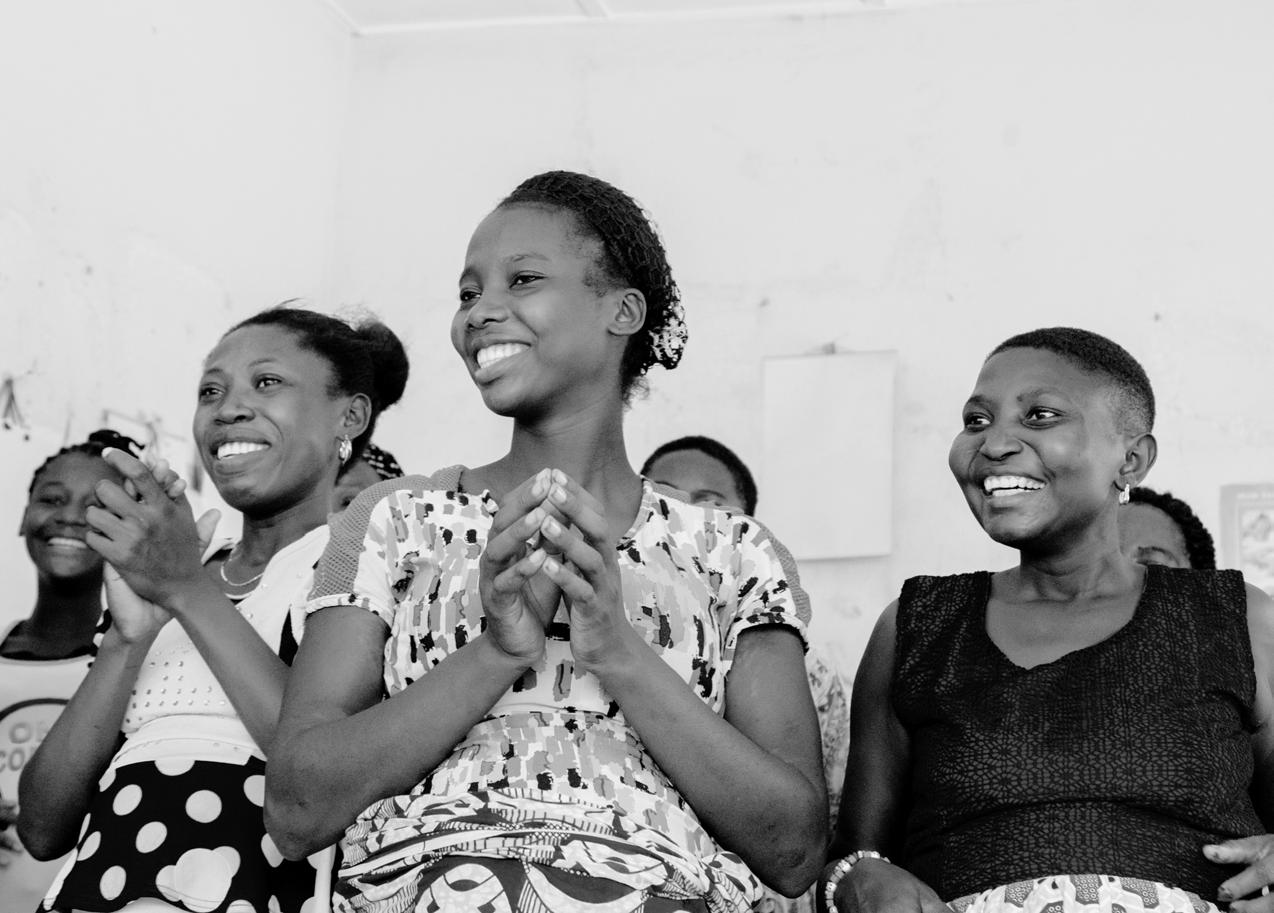
Being an accessible employer means removing barriers within IDRC employment practices, workplace culture and our physical locations. Our accessibility plan identifies the activities we are committed to completing over the next three years to make IDRC more accessible to people with disabilities. This work is underway.
The following is a summary of our progress and concrete initiatives planned for the coming year.
BUILT ENVIRONMENT IMPROVEMENTS
Enhancements include barrier-free washrooms and showers, universal washrooms on each floor, wide walkways, sliding doors to improve mobility and braille signage. We are conducting an inventory of doors to replace manual openers with automatic ones, particularly in our Ottawa facilities, and assessing where additional signage may be needed.
EMPLOYMENT
INFORMATION AND COMMUNICATION TECHNOLOGIES (ICT)
We've implemented messages and training for management regarding staff accommodation needs.
Adjustments include accommodating flexible schedules due to the teacher strike in Quebec.
Looking ahead to 2024, we plan to review the feasibility of adjusting internal meeting norms, introducing meeting-free hours and scheduling breaks between meetings. We are finalizing a statement on our career page to encourage applications from people with disabilities and conducting a thorough review of our employment systems.
A comprehensive accessibility audit of our website has been completed. Some barriers were identified, with plans for resolution in the 2024-2025 financial year.
Looking ahead, we will allow the public to request reports in different formats (e.g., braille) and arrange for sign language interpretation at our events.
COMMUNICATIONS (OTHER THAN ICT)
GENERAL ACTIONS
An email address for accessibility support has been added to our website. We have developed internal standards for sign language interpreters and instructions for events to ensure service are accessible.
An online mechanism for requesting accessible documents, such as braille printing, has been established.
Plans are in place to provide accessibility training for all staff in 2024 following our employment systems review.
We are developing an outreach strategy to engage the disabled community, set to be implemented by December 2024.
The Three Year Accessibility Plan (2023 – 2025) and 2023 Accessibility Progress Report are now accessible online on the Centre’s website in English, French, and Spanish.

Change to address environmental and social issues cannot happen without robust structures, systems and processes to guide effective decisions, oversee the implementation of policies and programs and ensure accountability for outcomes and results.
The Board of Governors oversees the Centre, providing strategic guidance and ensuring ethical conduct. It adheres to the IDRC Act and governance best practices. It operates through four committees:
1. Executive
2. Finance and Audit
3. Strategy, Performance and Learning
4. Human Resources
Each committee focuses on specific areas to provide detailed advice and ensure effective governance. ESG issues have Board oversight through the Executive Committee. More information on governance is available in our Annual report
Key focus areas for governance in 2023 were our code of conduct, ensuring an ethical supply chain and empowering IDRC employees to drive the ESG agenda.
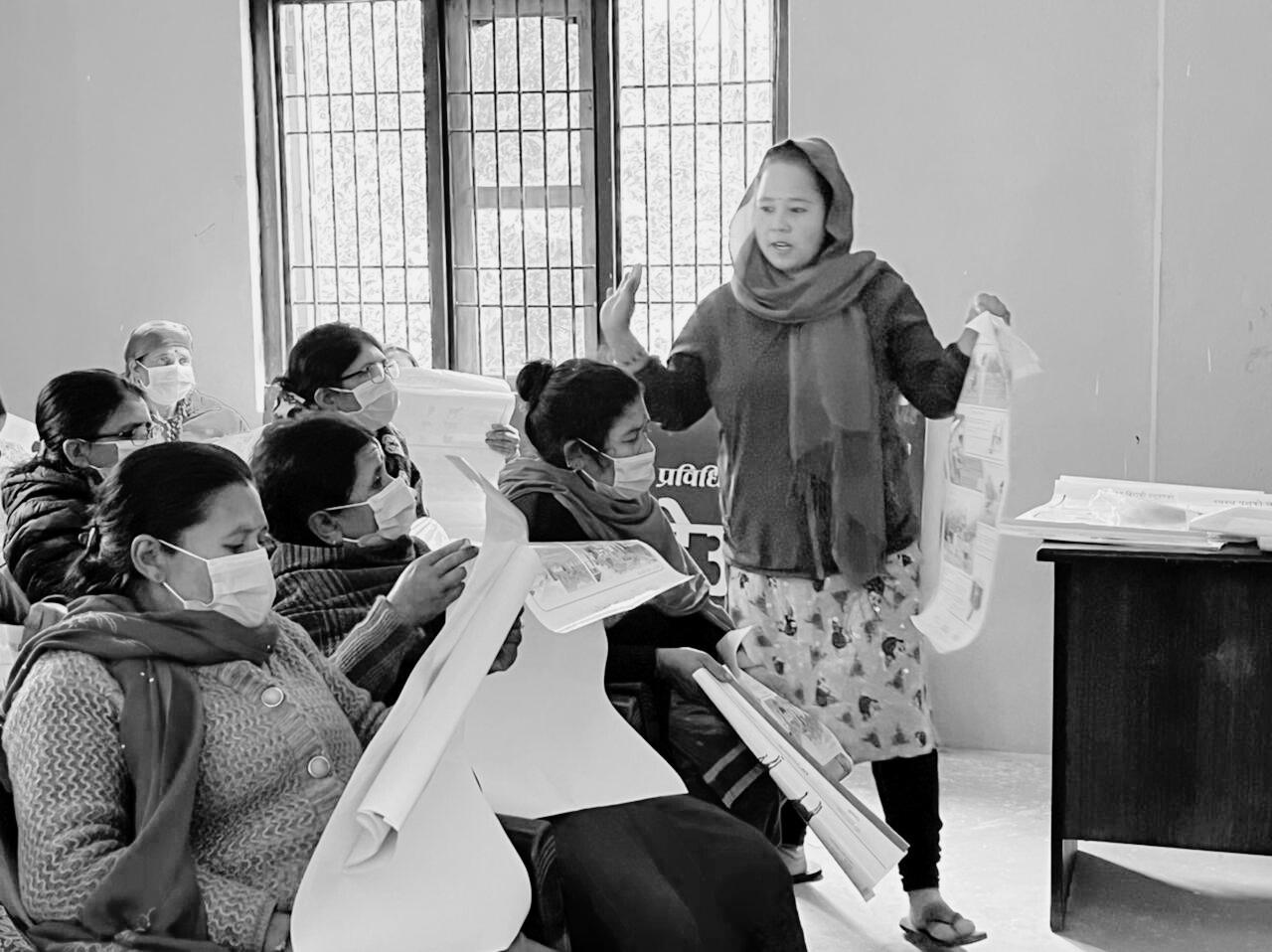
The materiality topics covered in this section include “Employee engagement and satisfaction” (11), “Human Rights” (13) and “Responsible and inclusive governance practices” (18).
Our ESG journey in 2022-2023 began with a comprehensive assessment of our Code of Conduct program, establishing key benchmarks such as annual reaffirmation of the code by IDRC employees, full compliance with the policy and annual confirmation of adherence by the Board of Governors.
As part of this assessment, we identified a need to review and align the code with our diversity, equity and inclusion program. Our communication strategy, the cornerstone of employee understanding and commitment to the code, also requires revision. This work is underway.
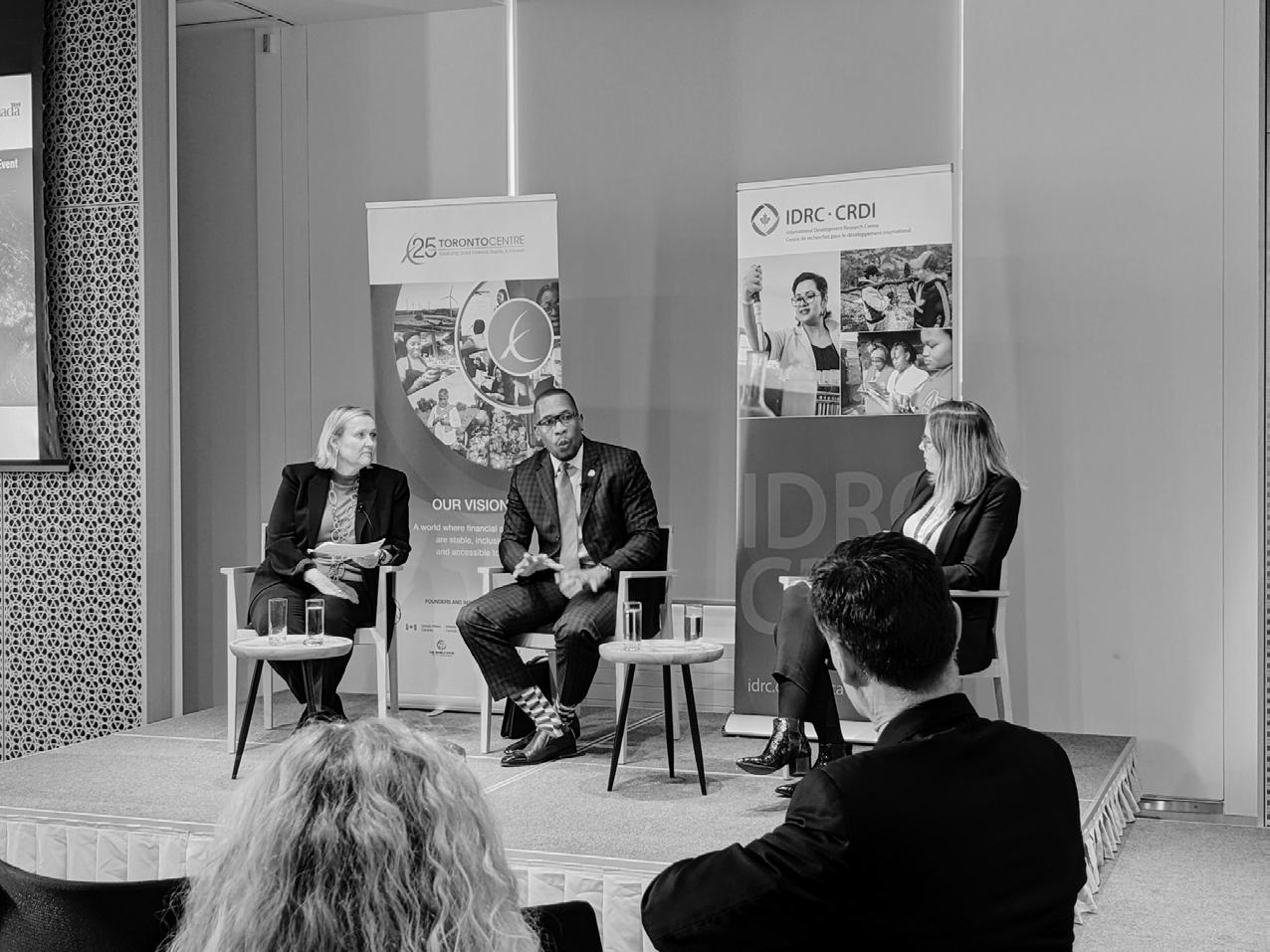
A supplier code of conduct is necessary to set clear expectations for ethical behaviour and ensure suppliers adhere to principles such as fair labour practices, human rights and environmental sustainability.
We are creating a new supplier code of conduct and revising our procurement policy to outline our expectations and standards for responsible and ethical business practices that we require our suppliers to adhere to.
Finalize the comprehensive update to our Supplier Code of Conduct to reflect our commitment to ethical procurement practices. Establish the new procurement policy framework to ensure responsible and sustainable procurement.
Submit the report responding to Bill S-211 on forced and child labour in supply chains. Begin a sustainable procurement and supply chain risk assessment project with the assistance of a third-party organization specializing in sustainability assessments for supply chains. Launch ClearView Connects™, an incident reporting tool that provides a platform for everyone to confidentially share concerns or incidents related to a range of unethical conduct.
These steps highlight our dedication to enhancing our procurement practices and ensuring compliance with stringent ethical standards.
In response to the Fighting Against Forced Labour and Child Labour in Supply Chains Act, IDRC has undertaken significant efforts to address forced and child labour in our supply chain.
This legislation mandates government institutions and private-sector entities to report on measures taken to prevent and mitigate the risk of forced or child labour within their operations and supply chains.
IDRC is currently working on a revision of the Procurement policy which will help establish a framework for sustainable and responsible procurement, ensuring all decisions prioritize environmental, social and economic impacts, supported by the Supplier Code of Conduct.
“The ESG topics are very central to the program of IDRC. I think everyone working at IDRC can relate to those topics.” ~ IDRC employee
Following the publication of our ESG report in June 2023, the Centre recognized the need to enhance our internal communications. Our goal was to develop a more effective strategy that keeps all employees informed and actively engaged in our ESG framework. To achieve this, we embarked on a qualitative research journey to understand and address the specific needs and preferences of our team members regarding ESG involvement and communication.
The research aimed to uncover key insights:
Employees’ feelings and attitudes towards the ESG framework
The extent of their desired involvement in these initiatives
The type of content they find most relevant and engaging
Their preferred communication channels and frequency
Employing a combination of focus groups and one-on-one interviews, we engaged employees from various sectors of the organization, including Operations, Funding and Partnerships, Research and Programming and our Regional Offices. This diverse participation helped ensure that our findings were rich, insightful and representative of our entire workforce.
Feedback indicated a high level of interest in the ESG topics, with many employees eager to contribute more actively. They expressed a strong desire for regular updates and more detailed information on how their roles could directly impact our ESG goals.
Based on these findings, we have mapped out several strategic enhancements to our internal communications. These improvements involve integrating success stories dedicated to ESG progress and employee contributions into our internal communication channels and platforms.
These changes are designed to keep our team well-informed and deeply integrated into our ESG efforts, reflecting our commitment to transparency, accountability and collective impact.

As we move into 2024-2025 and beyond, we are committed to enhancing the ESG framework we have established. In the upcoming year, we aim to share our goals and strategies more comprehensively with our employees and the wider community, recognizing that their energy and ideas are vital for advancing our ESG initiatives. We take pride in having developed a framework that leverages our strengths, yet we acknowledge the ongoing work required to contribute to a better world for everyone.